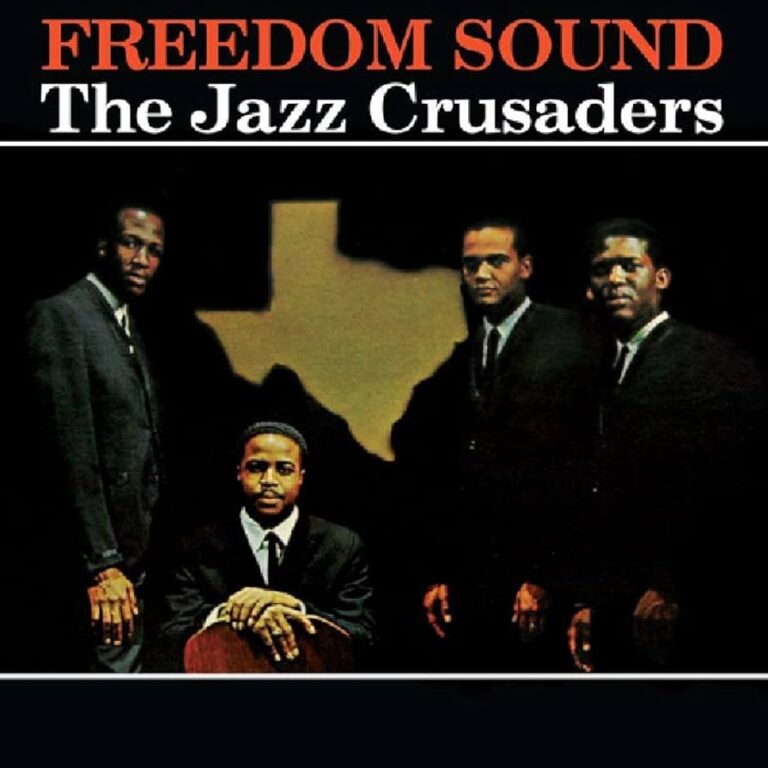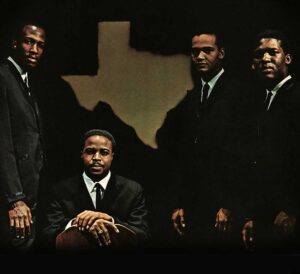The Jazz Crusaders are a group of many guises. Over the decades the band were actively recording and releasing albums, they went through five different names, an endless roster of bass players and a journeying sound that developed from Southern R&B and blues to bebop, soul and ultimately a vocal-led funk fusion that produced their best-known record, 1979’s “Street Life” with guest vocalist Randy Crawford.
Mostly remembered for their blend of fierce jazz improvisation with electric piano, clavinet and earthy, groove-laden basslines, The Jazz Crusaders have featured with some of the biggest names in 20th Century soul and pop. Stars like Bill Withers, BB King and Joe Cocker were guests on Crusaders records, while individual Crusaders members can be heard as session musicians on tracks by the likes of The Jackson 5, Marvin Gaye and Joni Mitchell.
Jazz Crusader Wilton Felder played bass on Joni Mitchell’s Edith and the Kingpin
Before the band found commercial success and individual artistry in other outfits, though, it was their debut album, 1961’s “Freedom Sound” that best encapsulated their fresh sound of powerful instrumental virtuosity, R&B-influenced melodics and that ever-present sense of groove. Across six tracks recorded on a single day in 1961, The Jazz Crusaders distilled a previous decade of hustling gigs in their hometown of Houston and along the West Coast into a seamless sequence of hard bop, gospel, civil rights protest anthems, blues and deep swing.

JAZZ CRUSADERS Freedom Sound
Available to purchase from our US store.The first iteration of The Jazz Crusaders was formed in the early 1950s by drummer Stix Hooper, who recruited his high school marching bandmates trombonist Wayne Henderson, pianist Joe Sample and saxophonist Wilton Felder under the name of The Swingsters. Playing a dance band repertoire of blues and Southern R&B, the band hit the local Houston scene, before falling under the spell of jazz in their late teens and adding a bassist and woodwind player to their ranks. Newly expanded, they renamed themselves The Modern Jazz Sextet and began honing their improvisatory skills before leaving school and moving west to LA, following in the footsteps of fellow Texan jazz artists like Ornette Coleman.
Rebranding once again as The Hollywood Night Hawks, a commercial move they thought would allow them to book gigs playing R&B and blues as well as jazz, the group embarked on establishing a foothold in the burgeoning West Coast jazz scene. After a few years of gigging between LA and Las Vegas, though, they found themselves still no closer to a record deal.
It was finally in 1961, thanks to a tip-off from Houston friend and Pacific Jazz saxophonist Curtis Amy, that the Night Hawks scored an audition for Pacific Records boss Dick Bock. Taken by their ensemble sound, Bock agreed to sign them on the spot and the group renamed themselves The Jazz Crusaders, reflecting their new mission to spread jazz to a wider audience.
Still featuring the original Swingsters quartet, the newly-christened Crusaders added bassist Jimmy Bond and guitarist Roy Gaines to their ranks and on 24 May 1961 hit Pacific Studios to record their debut, “Freedom Sound”.
The album begins in uptempo, joyous fashion with an intricate melodic line from saxophonist Felder and trombonist Henderson heralding the fast-swinging sound of ‘Geek’
before slowing into the languorous groove of ‘M.J.S. Funk’ where drummer Hooper and bassist Bond display a tight, intuitive connection beneath the changes. ‘Coon’, meanwhile, takes on a fractal, shifting rhythm testing Hooper’s syncopations and the sole cover on the record, ‘Theme From Exodus’, supplants the well-known Eddie Harris version with a lilting, balladic melody of its own.
The Jazz Crusaders certainly establish an immediate and energetic tone on “Freedom Sound” but the record comes into its own with the militaristic march of the title track. Composed in 1958 by pianist Sample, the eight-minute composition develops over a mournful piano melody and snare trills before blossoming beautifully into a defiant, keening solo from Felder that brings the group to a wistful, unified close. Written in protest against the racism the group experienced while growing up in the South, it is a deeply emotive piece of mood music that cements The Jazz Crusaders’ status not only as a fusion act capable of breaching the charts but a band with the capacity to write timeless standards for generations of jazz artists to come.
Read on…Nubya Garcia’s Journey to Self Belief
Ammar Kalia is a writer and musician. He is the Guardian’s Global Music Critic and writes for the Observer, Downbeat, Jazzwise and others. His debut novel, A Person Is A Prayer, is out now.


